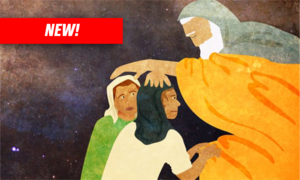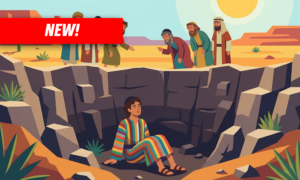(משיחת שבת פרשת וירא, כ”ף מר-חשוון, ה’תשמ”ג)
A. G-d’s promise and its materialization
At the covenant of parts, G-d promised Abraham a son from who the Jewish people would emerge (Source 1). Almost thirty years passed and Abraham and Sarah still weren’t blessed with children. Then the incident of Sarah and Abimelech takes place: G-d punishes Abimelech, who returns Sarah to Abraham and Abraham prays for G-d to heal Abimelech (Source 2). Several months later, Sarah conceives and gives birth to a son (Source 3). Rashi explains that in the merit of Abraham’s prayers for Abimelech and his family that they be healed, Sarah too was healed and was able to conceive.
B. One who prays for their fellow is answered first
G-d had already promised Abraham children at the covenant of parts, yet it took 30 years for it to materialize. Only after Abraham prayed for Abimelech did the miracle happen. This teaches us the great virtue of praying for mercy for one’s fellow.
Praying for one’s needs is a biblical commandment, and one’s own life takes precedence over someone else’s life (Sources 4-5). Accordingly, one ought to first pray on their own behalf. However, we are nevertheless told to t pray for our fellow first.
C. Mutual benefit
Even if one prays for their fellow in the hopes that they will thus be answered first, that’s OK. The main thing is they are praying on behalf of their fellow. Similarly, if someone lost money and it was found by a pauper, the person who lost it fulfilled the mitzvah of giving charity, because what matters is that the recipient was helped by it.
Obviously, however, the ultimate level is that our fellow’s needs should be more important to us than our own.
D. One who takes action for their fellow is answered first
In next week’s Torah reading, we learn of Isaac and Rebecca’s marriage. Rashi explains that while Abraham was busy finding Isaac a match, Isaac was busy finding Abraham a match – bringing Hagar back. In the merit of helping his father, Isaac was answered first.
The Rebbe wrote this idea in a letter to Shifra Morozov, a Chabad Chassid whose husband was killed at war, that in the merit of the help she gives others who lost family members in the war she will be answered first.
Story: The other and “I.”






